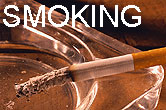- Could Your Grocery Store Meat Be Causing Recurring UTIs?
- Are You Making This Expensive Thermostat Error This Winter?
- Recognizing the Signs of Hypothyroidism
- 10 Strategies to Overcome Insomnia
- Could Artificial Sweeteners Be Aging the Brain Faster?
- Techniques for Soothing Your Nervous System
- Does the Water in Your House Smell Funny? Here’s Why
- Can a Daily Dose of Apple Cider Vinegar Actually Aid Weight Loss?
- 6 Health Beverages That Can Actually Spike Your Blood Sugar
- Treatment Options for Social Anxiety Disorder
Cancer Patients Who Smoke, Drink May Face Longer Feeding Tube Use


Smoking and heavy drinking seem to increase the risk that patients with head and neck cancer will need a feeding tube for an extended time after treatment, new research suggests.
The study included 104 patients with squamous cell cancer of the head and neck. The patients had treatment with either a combination of chemotherapy and radiation or radiation alone. Twelve months after treatment, 35 percent of the patients were still using feeding tubes.
Risk factors for prolonged feeding tube use included current heavy drinking and current smoking, according to the study. But, when the researchers took into account other factors that might influence the length of time a feeding tube was needed, only smoking remained a risk factor.
Although the new study wasn’t designed to tease out whether smoking or excessive drinking actually caused the longer use of a feeding tube, the researchers said there are a number of reasons for the possible association. One is that nicotine may suppress appetite, so patients make less of an effort to resume eating by mouth. It’s also possible that both smoking and drinking may reduce patient motivation to resume eating after treatment, the study authors said.
Still, the findings suggest the need to advise patients to avoid smoking and heavy drinking during treatment, Dr. Patrick Sheahan, of the South Infirmary Victoria University Hospital in Cork, Ireland, and colleagues explained in the report published online March 19 in JAMA Otolaryngology-Head & Neck Surgery.
But it’s not clear from the current study whether stopping smoking and drinking would shorten the time someone needed a feeding tube, the researchers pointed out in a journal news release. Further studies need to be done to determine if that’s the case, they added.
More information
The U.S. National Cancer Institute has more about head and neck cancers.
Source: HealthDay
Copyright © 2026 HealthDay. All rights reserved.










